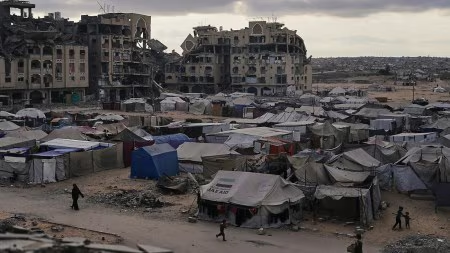A Journey of Dreams That Ended in Tragedy
In the quiet lanes of Jharkhand’s Dumka district, the sound of grief has replaced the laughter that once filled the small house of 32-year-old migrant worker, Imran Ansari. A father, husband, and dreamer, Imran’s story began like thousands of other Indian workers seeking better prospects abroad. He left home with hope in his heart, determined to provide his family a life free from struggle.
But miles away in Saudi Arabia, his dreams ended in the most heartbreaking way. Imran lost his life in police firing, a tragedy that stunned both his village and fellow Indian workers abroad. Before his death, he managed to send one final voice note to his wife words filled with love, confusion, and the haunting realization that the bullet that struck him wasn’t meant for him.
His message, sent just minutes before his death, now remains a lasting memory a tender farewell from a man who never imagined it would be his last.
The Final Voice Note
“Don’t worry about me,” Imran said in his message, his voice trembling yet calm. “There was some firing here… the bullet wasn’t meant for me. I’ll be okay.”
Those were his last words to his wife, Fatima Begum, before silence fell forever. The short audio clip, now replayed countless times by his devastated family, captures the fear and uncertainty of a man caught in chaos.
For Fatima, every word from that recording feels like a wound. “He promised to come back soon,” she whispered, her eyes welling up. “He said he wanted to build a new house, to see our daughter go to school. He didn’t deserve this.”
The Hard Road Abroad
Like many young men from Jharkhand, Imran’s decision to work abroad was born out of necessity. Limited job opportunities, coupled with rising expenses, forced him to leave home three years ago. He found work in Saudi Arabia, initially as a construction helper before moving into a logistics company that provided better pay.
“He was hardworking, respectful, and determined,” recalled one of his cousins who had helped him secure the job. “He would always send money home on time. His only dream was to educate his children and take care of his parents.”
Each month, his modest earnings sustained the entire family his parents, wife, and two small children. The money he sent home wasn’t just currency; it was hope, love, and the reassurance that distance could never weaken his sense of duty.

The Day Everything Changed
According to those who worked with him, the incident took place when a commotion broke out near his worksite in Riyadh. Police forces arrived to control the situation, but in the confusion, shots were fired. Imran was caught in the crossfire.
Witnesses said he wasn’t involved in any altercation he had simply stepped outside to help a friend when the firing began. One stray bullet struck him, and within moments, he collapsed. His co-workers rushed to get help, but it was too late.
“Imran was always calm,” one of his roommates said. “He never got into fights. That day, he was just in the wrong place at the wrong time.”
A Family Shattered
Back home in Jharkhand, the news arrived like a thunderbolt. Fatima fainted upon hearing it. The village gathered around their modest home, offering words of comfort that could barely touch the depth of the family’s pain.
His father, Abdul Rahim, sat in silence, clutching his son’s photograph. “He called me two days before it happened,” he said softly. “He was worried about his younger brother’s college fees. I told him not to worry, that we would manage. I didn’t know it would be our last conversation.”
In the background, Imran’s two young children one barely old enough to understand loss kept asking when their father would return.
The Long Wait for His Body
For families of overseas workers, tragedy often brings with it another painful ordeal the wait to bring their loved one home. Days turned into weeks as paperwork, permissions, and procedures delayed the repatriation of Imran’s remains.
Fatima would sit near her phone, waiting for updates. “All I wanted was to see him one last time,” she said. “He went there alive to earn for us. Now, he’s coming back in a coffin.”
Local officials and community organizations intervened, helping expedite the process. When his body finally arrived, the entire village turned out to pay their respects. The air was filled with tears, prayers, and disbelief.
Dreams Unfulfilled
Imran’s life was one of perseverance and quiet courage. He never complained about the scorching desert heat, the long hours, or the loneliness that came with being thousands of miles away from home. He often told his wife that every hardship would one day lead to comfort for their family.
He dreamed of starting a small business in Jharkhand perhaps a grocery store or a transport service. “He didn’t want to stay abroad forever,” Fatima recalled. “He wanted to come home and live with his parents. He used to say, ‘Money is not everything; family is.’”
Now, those dreams have turned into memories, kept alive in the hearts of those who loved him.
The Voices of Other Workers
Imran’s story is not an isolated one. Thousands of Indian workers in the Gulf face risks and hardships daily from unsafe work environments to emotional isolation. For many, their lives exist in a delicate balance between sacrifice and survival.
One of Imran’s colleagues described the fear that followed the incident. “We all felt helpless,” he said. “When something like this happens, it reminds us how fragile our lives are here. One moment you’re working, the next… you’re gone.”
Despite the fear, these workers continue to show resilience. They send money home, care for their families from afar, and carry on because they have no other choice.
The Power of a Voice
The voice message Imran sent that day has now become a symbol of both love and loss. It represents the countless messages sent by workers to families across India small snippets of their lives, packed with longing and reassurance.
His final words “The bullet wasn’t meant for me” have resonated deeply with people who heard his story. They capture the tragic irony of a life taken not by fate, but by circumstance.
For Fatima, that message is both a comfort and a curse. She listens to it every night, as if hoping to hear him speak again. “Sometimes I close my eyes,” she says, “and imagine he’s still there calling me after work, asking if the children ate, laughing about something silly. That voice keeps me alive.”

A Community United in Grief
In Dumka, Imran’s death has brought the community together in an unprecedented show of solidarity. Neighbors, local leaders, and social workers have rallied to support his grieving family. Fundraising drives are underway to help secure his children’s education and provide financial stability to his wife.
Many have also called for stronger protections for migrant workers abroad. “These young men go out to build the economies of other countries,” said a local activist. “The least we can do is ensure their safety.”
Lessons Beyond Borders
Imran’s story shines a harsh light on the struggles faced by millions of Indian workers abroad. They leave behind families, language, and familiarity to work under difficult conditions, driven by love and duty. Yet, when tragedy strikes, they often die in silence their stories fading before they can reach home.
It also raises questions about the systems meant to protect migrant laborers about accountability, transparency, and human dignity. Imran’s case, while heartbreaking, may inspire change if it leads to better awareness and stronger advocacy.
Remembering Imran
In the end, Imran Ansari will be remembered not just as a victim, but as a symbol of courage and devotion. A man who worked tirelessly for his family, who believed in dreams despite the odds, and who faced his fate with quiet dignity.
His children will grow up hearing stories about their father about how he crossed seas to give them a better life, how he cared deeply, and how his love continues to protect them even in his absence.
Fatima, holding her husband’s photograph close to her chest, finds strength in his memory. “He may be gone,” she says softly, “but he’ll always live here in our hearts, in our prayers, in our dreams.”
A Message That Lives On
Imran’s final voice note was meant to comfort his wife, to tell her not to worry. In the end, it has become a message for all a reminder of how fleeting life can be, and how love transcends even death.
“The bullet wasn’t meant for me,” he said. Yet, those words now carry deeper meaning. They speak for every migrant who leaves home with hope, who faces risks silently, and whose sacrifices too often go unnoticed.
Imran’s story full of struggle, love, and unfulfilled dreams reminds us of the extraordinary courage hidden in ordinary lives. His journey, though cut short, will continue to echo across borders, touching hearts wherever compassion still lives.
Do follow Gulf Magazine on Instagram.



